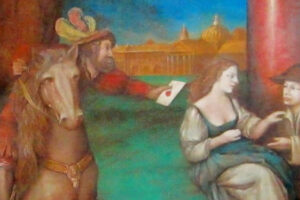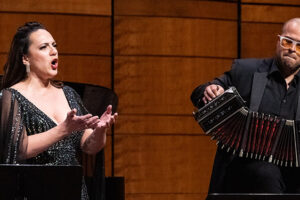
Pytor Ilyich Tchaikovsky’s Eugene Onegin is his masterwork and its themes of social convention and unrequited longing surely struck a deep chord in a composer who, in late 19th century Russia, was gay and had to conduct himself carefully.
I’d like to say a brief requiem for the Metropolitan Opera’s last production, brilliantly designed by Michael Levine and directed by Robert Carsen. Its strong use of color and abstraction brought an easy focus to the unabashed romanticism and melancholy of this work.
The very handsome replacement, which is a co-production with the English National Opera, debuted on opening night of this season and seems, on the surface at least, to be more cinematic in style. In spite of the mountains of detail in the photo-realistic sets and costumes—to quote Tallulah Bankhead—“there’s a lot less here than meets the eye.”
Much was written in these pages, and the media, about Director Deborah Warner withdrawal due to medical necessities and her partner, the grand and glorious Fiona Shaw, stepping in at the last moment to midwife the proceedings. Even Shaw had a tight schedule to keep and departed prior to the debut leaving the cast to an assistant with a production book from the ENO. Probably best then that the Met and our friends at Deutsche Grammophon chose to release to home video not the livestream of the opening night but the HD transmission of the matinee nearly two weeks later when everyone had a chance to settle in after a few performances.
Of course the raison d’etre of this whole affair is Anna Netrebko’s first Tatyana at the Met, having enjoyed a great success in her role debut the previous April at the Vienna Staatsoper . It’s interesting how the 17-year old girl of Pushkin’s novel in verse tends to be a late career choice for many sopranos. It’s a big sing over a large orchestra, no doubt, and quite a few star sopranos have waited until they were 50 or damn close.
When Debbie Voigt, who does the pre-game and half-time show, asks our Anna why she’s singing Tatyana now her blunt reply is,”I wait for when I’m ready”. Glad are we of that for she certainly shows she’s up to the task at hand with a beautifully rendered portrayal, not only musically but from an acting standpoint as well.
The first three scenes take place in the same sunroom on the Larin estate and I can only assume that this was a selling point of economy in a production this grand although it makes little sense dramatically. Its relentlessly shiny mylar floor stays with us throughout.
It’s a pleasant surprise to find the luxury casting of Elena Zaremba as Madame Larina, especially she was the Olga, Tatyana’s older sister, in the previous HD transmission in 2007. Funnier still that I found her at that time, shall we say, a bit long in the tooth for Olga but now too youthful looking to play Madame. She’s beautiful and touching in this role, most especially when she comforts her daughters after the horrible confrontation in the party scene.
To have Larissa Diadkova as the nanny Filippyevna, is an embarrassment of riches, though she all but disappears into her character’s severe hair and plain make-up. Her opening duet with Madame Larina is always one of my favorite moments in this piece and they bring it off beautifully. She also plays the role completely straight with none of the pseudo-comic, comprimario schtick we’re often subjected to.
It shouldn’t be surprising that with so many singers close to the source here the interactions take on an uncommonly conversational quality at times. The very young Olga of Oksana Volkova is an especially strong proponent of this style and her first little aria with its couplets benefits from her charming and spontaneous delivery. It’ll be a voice to watch for too since, in spite of the fact that she’s lithe and apple-cheeked, she’s got chest voice like a bulldozer.
Piotr Beczala finds the perfect straight-arrow bookworm in Lenski, making his belligerence in the party scene when he feels betrayed all the more frightening. He too is especially vivid in the conversational portions of his role and his Act II aria before the duel is sung to great emotional effect treading lightly on the side of the lachrymose.
When Aunt Debbie asks our baritone at the break why he enjoys singing Onegin, Mariusz Kwiecien points out, with maybe a tad too much candor, that it is a leading role after all. Not surprisingly, his characterization is self-assured to say the least; by the modern day Bro-code his Onegin would most certainly be labeled a douche. Maybe he’s not as stentorian as some of the baritones we’ve encountered in this part, but that’s all for the better. He’s relaxed and louche in his early scenes and even ends his aria of reproach to Tatyana on a lovely mezzo-piano. In the last two scenes it does become a bit much with the histrionics amped up but I point the finger at the director there more than Mr. Kwiecien.
Speaking of the last scenes it would be asking the universe for far too much if we had an absolutely stellar cast from top to bottom now wouldn’t it? Darwinian theory takes a human form in Alexei Tanovitski as Prince Gremin. He’s either suffering from a ghastly case of stage fright or has been mistakenly informed he’s entered a yodeling contest
Netrebko comes to Tatyana looking fresh and youthful and she’s believable as a meek, young girl who knows her mind. Her singing in the letter scene finds her in equal parts delicate and righteously strong in the same thought. She has a deliciously quiet “Winterstürme” moment towards the end when she opens the glass doors on the backyard in the moonlight. Though much of her singing is excitingly powerful she does takes her time on some phrases, singing them quietly, creating a quality of introspection I can’t recall ever hearing before. She ends the scene exhausted, on the floor, and having gone through so many dramatic transitions at that point it’s no wonder.
Her entrance in the St. Petersburg act finds her singing in a glacial piano as befits her new stature and it’s a magnificent piece of vocal stage craft. Her red velvet couture gown with train might seem excessive even by the standards of the Romanovs and she looks strikingly like her great compatriot Galina Vishnevskaya at certain angles.
Naturally once the fires have been stoked in the last scene she lets fly and she does come off the voice once or twice for a high note but I’m sure it can be blamed on the heat of the moment at the end of a long performance. It takes a strong woman to pull off the finale of this staging and Ms. Netrebko is that woman. Her portrayal is completely thre- dimensional and I think the most successful I’ve seen of this character.
My problems with the staging are several. It’s aggressively choreographed to no end. Act I finds the field workers doing what looks like an Apache dance in the Larin house, I know not why. The following scene at the name day party is good but once we’re at the ball in St. Petersburg the Écossaise looks like some frantic predecessor to the Lindy Hop.
The duel, fought with shotguns(?) ends with Lenski falling forward(?) after getting it with both barrels. Oh, and Onegin shows up for the duel munching what looks like a Subway sandwich. Product placement at the Met, have we come to this?
The last scene takes place in a snowglobe which means that set designer Tom Pye gives us two opening settings with hyperrealistic design and then two more scenes of essentially abstract design. Onegin starts the last scene immediately on his knees in front of Tatyana in a state of high emotional torment. It’s the beginning of the scene, for the love of Pushkin… where has he got to go from there?
I also have to add that all of the orchestral introductions are accompanied by cinematic presentations that aren’t even close to the artistic level of any of my nephew’s video games and they overpower and belittle the great music that they accompany.
Maestro Valery Gergiev is driving the Rolls Royce in the pit and at the break he speaks of Tchaikovsky’s music being, for him, honest and truthful and not sentimental and that’s exactly how he plays it. He also says that as a schoolboy they were made to memorize the entire Pushkin. His is a beautifully balanced reading, perhaps a tad heavy on the string basses here and there, but the Met Orchestra plays with a vigorous impetuousness. They’re bright and clean and full of passion as are Donald Palumbo’scChorus which has never sounded better.
The costumes by Chloe Obelensky and most especially the lighting by Jean Kalman looked absolutely magnificent on the Blu-ray I viewed, giving the presentation a cinematic feel. DTS-HD 5.1 audio was perfectly balanced and lots of subtitle options I’ll return to this disc again for its excellent singing and superbly crafted characters and Anna, of course. It’s a keeper.
























Comments